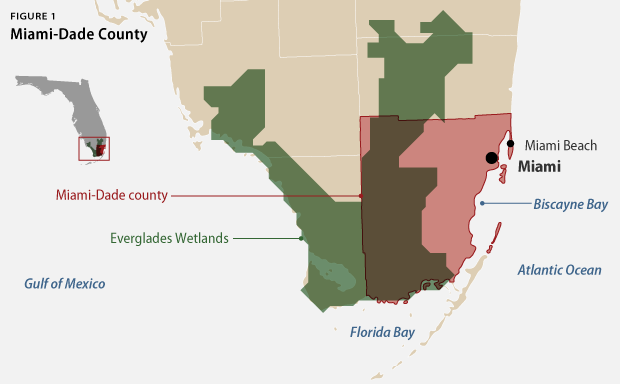Miami-Dade County is famous for its warm Atlantic beaches and vast Everglades marshlands that draw millions of sun-seeking vacationers every year. This global tourism mecca on Florida’s Southeastern tip is also the self-proclaimed “gateway to Latin America and the Caribbean” and a major trade, banking, and real estate hub. But in recent years, Miami-Dade’s image as a haven for those seeking carefree subtropical living has been confronted by a new phenomenon. Climate change is bringing more flooding, extreme heat, and other impacts that affect the way people live, work, and even vacation in this low-lying county.
In Miami-Dade—the United States’ seventh most populous county—the symptoms of climate change are undeniable. The sea level has risen about a foot since the pre-industrial days of the 1870s, and the increase is expected to accelerate in coming years, with projections of up to 6.8 feet sea level rise by 2100. Flooded streets are becoming routine even on sunny days, triggered not by extreme storms but by high tide. Rising seas will exacerbate the impact of hurricanes, which remain ever-present threats. The number of days with temperatures higher than 95 degrees Fahrenheit in Florida and other Southeastern states has steadily increased since 1970, putting the health of residents at risk. These dangerous climate change effects pack the hardest punch in the county’s sizeable low-income communities, which lack the economic stability and quality housing to safely weather the stifling heat and flooding that are part of the new normal.
Despite these risks, a majority of residents and leaders in Miami-Dade are just starting to consider building resilience to the consequences of climate change. If county leaders act quickly, they can take advantage of opportunities to build climate change resilience in ways that support equitable economic growth and allow all South Florida communities to thrive in the 21st century. Some of these opportunities include:
- Prioritizing climate change resilience and mitigation starting with implementing existing county recommendations and embedding climate risk reduction management into planning and policies across all county government offices.
- Improving public knowledge of climate change risks through education and outreach to the county’s diverse communities.
- Creating a public climate change forum to ensure Miami-Dade residents receive an opportunity to voice their concerns and ideas for strengthening equitable resilience to County officials.
- Mapping social and climate vulnerability and developing resilience solutions using data and community input to help planners and emergency responders focus resources on addressing the most urgent resilience needs.
- Strengthening and leveraging social cohesion to help Miami-Dade’s low-income communities prepare for climate change impacts, and expand knowledge of available resources to build climate resilience.
- Leveraging community organization strengths to help county leaders communicate with low-income residents and provide resilience assistance to those vulnerable to climate change risks.
- Planning for storm displacement before it happens by prioritizing extreme weather preparedness and incorporating lessons learned from other metropolitan regions that experienced mass displacement of residents by extreme storm damage.
By taking these steps, county leaders can make rapid progress toward building equitable climate change resilience across Miami-Dade County. In addition to describing these steps in more detail below, this report assesses the growing risks of climate change in Miami-Dade County, particularly in low-income areas.

Cathleen Kelly is a Senior Fellow at American Progress. Miranda Peterson is a Research Assistant for the Energy Policy team at the Center. Madeleine Boel is a former Energy Policy team intern at the Center.